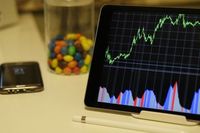Can robots replace human traders?

Back in 2017, the financial world was shaken by the news that investment bank Goldman Sach’s, based in New York, had sacked 600 of its traders. They were replaced by computer engineers with the responsibility of managing automated trading software. At the time, one senior figure at Goldman Sach’s suggested that it was possible to replace four traders with just one software engineer.
That development wasn’t just a good headline. It represented the latest development in the evolution of artificial intelligence, which has made itself felt across a number of businesses but is making its biggest progress in the financial markets, where, according to many of the news headlines, we appear poised on the brink of a big data and bitcoin future. The potential use of artificial intelligence to replace human traders has obvious cost benefits. But can a robot really outperform a human?
Robots struggle in day trading
New technology has enabled us to effectively teach artificial intelligence the rules of trading. But it is noticeable that no investment bank in the world has replaced all of its traders with robots, not even Goldman Sach’s. Human day traders are still a vital part of the international stock trading sector all around the world. In fact, aside from some niche trading areas where investment companies are involved in repetitive high-volume trading, robots struggle to compete with humans.
The main reason is the ability to adapt. A piece of trading software can learn the relevant historical data and mimic trade patterns. Yet the behaviour of the stock market is constantly changing. Human traders have the ability to adapt to change quickly, while making adjustments to an algorithm can be a costly and time-consuming business.
There is a further problem. Learning to be able to react to changes in the market is an important part of the education of human traders. The danger is that traders who learn with the assistance of automated methods may not develop the skills they need to succeed.
Humans make the decisions
This is why ultimately it is humans who make the decisions. Although computers are a huge part of the global trading sector, mostly the robots or algorithms are focused on prediction and analysis of market trends. The eventual decision on whether to buy an asset or to sell it will usually be made by a human. This process may include some element of automation, such as instructing an algorithm to make a trade when the price hits a certain level, but the human is still in charge.
Although it is possible to produce algorithms that do a reasonable job of predicting market trends based on history, the fact that the market is essentially a human construct means that it will always contain an element of unpredictability. Humans aren’t always rational and although it is possible to use some forms of automated analysis to accurately predict the next moves in the market, it is hard for robots to accurately model the effect of hype, rumours or general economic news, and the sometimes irrational ways in which humans react to those factors.
The diminishing returns of trading automation
Using artificial intelligence has obvious advantages in terms of making high volumes of predetermined trades, or in certain trading scenarios. And in those areas, using robots to handle the day to day business of trading can provide some cost savings and advantages. At the moment, only a few individuals or companies can afford to run the artificial intelligence necessary for the job.
But that technology will eventually become available to everybody, while the market data used to train artificial intelligence is publicly available. The more effective that artificial intelligence becomes at trading, the more likely it is that the technology will become publicly available. This will mean that using artificial intelligence is likely to have diminishing returns as all traders are replaced by robots that essentially trade rationally. Trading would then become more predictable, and the nature of the stock market might change completely to one where significant new profit is impossible.
There is no doubt that the advances made in artificial intelligence have a huge amount to offer to the financial sector, and in handling bulk trades in certain niche areas or in analysing large volumes of market data, robots have an obvious advantage and can bring considerable benefits. But the human element remains the vital and dominant factor in the trading sector and is likely to do so for the foreseeable future. Artificial intelligence, at least, the iterations of it that we have seen so far, is not yet ready to take over from human traders.

